December 28, 2012
Free Fred
November 21, 2012
Pride and Prejudice ***
I loaded this book on my Kindle when I was stuck at the car shop. Mr. Bennett grabbed me immediately, and although he's a minor character, I looked forward to every scene he inhabited. His articulate cynicism and sarcasm steal the show in my view. He needs his own book.
As for the rest of the story, this is the first Austen book I've read. She's an excellent writer, but I'm definitely not her target demographic. I wearied of the constant dithering about who was going to hook up with whom, and all the unnecessary drama that happens in books such as these when manners or honor prevent people from just coming out and saying what needs to be said.
In other news, I will be making a second appearance on the BBC World Book Club as a caller asking a question about Pride and Prejudice on the Dec 3 taping of the show. Maybe this time I won't pronounce "metaphor" as "metafer."
November 1, 2012
Thesaurus of Alternatives to Worn-Out Words and Phrases **
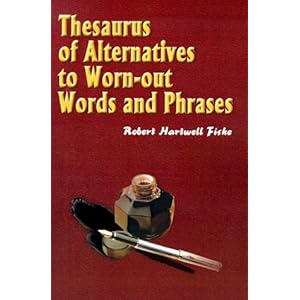
My mom got this for me at a garage sale or some such a year ago. I gave it the upstairs bathroom position, reading the 310 pages in two or four page chunks.
I mainly skimmed through the phrases to keep fresh in my mind what not to use. After the first few pages, I didn't read much of the alternatives copy.
It's good to remind yourself occasionally of the cliches and tired terminology you use without thinking of it, so you can toss that out and create something fresh. However, Fiske's tone is snobbish, with didactic pronouncements such as:
Infantile phrases are popular among adolescents--and dimwits who still think like them.
Ineffectual phrases add only to our being ineffectual people.
If it weren't for our plethora of metaphors, especially sports images, dimwitted men and, even women would be far less able to articulate their thoughts.
Hence the skimming. I can use the list without the condescension.
October 25, 2012
Grifter's Game ***

This is the first book Block got published under his own name. He does noir as good as anyone, and this novel has all the classic elements, not the least of which is the tone. Joe has the right mix of canny intelligence and world-weary wisdom. Of course, that doesn't save him from falling under the spell of Mona.
If you're a fan of noir, you should check this one out.
October 23, 2012
My 24 Hours with a Coral Snake
In case you're unfamiliar with the ways of the coral snake, it’s one thing to pull out your Swiss army knife, cut two Xs in your leg, and suck out rattlesnake venom. It’s another thing to amputate your hand. Unlike the venom from vipers, which travels through the bloodstream, the venom from a coral snake is a neurotoxin. It travels through the nervous system, causing your respiratory system to fail within hours. You can’t suck venom out of your nerves. Outside of antivenin, the only remedy is to cut off the poisoned limb, hopefully before the venom has passed the particular joint you are chopping on.
Yes, quite gruesome, but such is nature, red in tooth and claw. I had a morbid imagination. I went through my requisite Poe, Lovecraft phase, as one does.As an adolescent I also wondered such things as whether I could withstand torture for my faith like Brother Andrew.
October 18, 2012
Buck Fever ***

During the course of a discussion about a future writing project I have in mind, Tosh mentioned I should read this author from Blanco. So I did.
It's a bit of a slapstick a R-rated comedy involving poachers, rednecks, Columbians, an opportunistic ex lobbyist, and game warden, inspired by Carl Hiaason, who is also on my to-be-read shelf.
Rehder has racked up some impressive credits, from multiple Edgar award nominations to best-of-the-year lists in multiple periodicals.
If you like wacky stuff, you should check it out.
October 11, 2012
Angle of Investigation ****

Somewhere along the way I discovered three Kindle-only collections of Bosch short stories, three stories each. A nice way to tide me over until The Black Box comes out next month.
This is classic Bosch, filling in some back story not covered in the novels. One is the case mentioned in a later novel of a killer being caught because of a hand print left over a toilet.
Great price, great stories for any Bosch fan.
October 4, 2012
Regarding Ducks and Universes **

Clever idea, the ability to travel as a tourist between parallel universes where your doppelganger resides, and the myriad regulations to prevent you from interfering with your alter ego or disrupting the space-time continuum. And the protagonist is a technical writer. What's not to like?
For me, that would be a passive protagonist. Despite the rules, Felix A wants to learn more about his alter. He checks a bookstore to see if Felix B has already written the book Felix A plans to write, and then goes to a detective agency to have them investigate Felix B. Then he his promptly locked up in quarantine and the forward momentum of the story grinds to a halt. Once he gets out, in a plot point that would take too long to relate here, he falls under the control of an investigative team and the action is driven by others, not the protagonist, for the large majority of the book.
That's not a satisfying story. I much prefer a pro-active protagonist who actively pursues his goal and overcomes obstacles. But it is a clever idea with some bright spots.
September 27, 2012
The Grove ***

This is one funky book, a fascinating look into the disintegration of a mind when a guy with a mental/mood disorder goes off his meds.
It starts when the farmer finds the body of a high-school girl in a grove beyond his cornfield and doesn't go to the authorities. Soon he's having conversations with the girl, which degenerate further into psychosis as the body decomposes.
It sounds morbid, but it's actually fascinating. Rector knows what he's doing. I'll have to check out his other books.
September 20, 2012
The Stones Cry Out ***
I've seen Sibella here and there on the interwebs, but when I saw her interview on Writers On Reading, I realized I'd never read any of her books. So I jaunted down to my favorite Kindle store and got the first in the series.
This book won the Christy for first novel, which is saying something when your competition is Tosca Lee! It's a good story (Raleigh Harmon, forensic geologist turned FBI special agent in Richmond, VA) with good pacing and good characters and a great start for a series. You get a feel for the history of the town, the vanishing Southern culture, the miasma of racial tension. And then there's the case nobody wants solved except for Raliegh. Not even the mayor or Raliegh's boss.
I'm definitely reading the whole series, and anything else Sibella writes.
September 15, 2012
Life of Pi, Yann Martel
September 13, 2012
Boost ***
This was a fun read. Snappy dialog, good pacing, great characters. Steve does the Bubba Mabry P.I. series, which I will have to check out, but Boost is evidently a standalone. Too bad. I'd like to see more of Sam Hill. (Yep, his name is Sam Hill, but not one "What in the Sam Hill?" joke in the book. Go figure. ;-)
So, check it out. Or else.
September 6, 2012
True Detective ***
 Collins can write, which comes as no surprise. He wrote Road to Perdition. This was an early attempt to reinvent the noir tradition. As indicated in the notes, his mentor and his agent said he needed to rewrite it because it was in first-person and over 100,000 words. His other mentor, Mickey Spillane (!!), called it the best private eye novel he'd ever read. Collins fired his agent, finished the novel, and it sold to the first publisher his new agent shopped it to. He went on to write 18 Heller novels, so far.
Collins can write, which comes as no surprise. He wrote Road to Perdition. This was an early attempt to reinvent the noir tradition. As indicated in the notes, his mentor and his agent said he needed to rewrite it because it was in first-person and over 100,000 words. His other mentor, Mickey Spillane (!!), called it the best private eye novel he'd ever read. Collins fired his agent, finished the novel, and it sold to the first publisher his new agent shopped it to. He went on to write 18 Heller novels, so far.I have likes and dislikes with this novel, mostly likes. Great noir vibe, first person voice nails it. Great story woven into actual historical events with actual people from 1932. Buckley did this with the Blackford Oakes espionage novels and I ate them up. Collins brings it with the Heller series.
My only dislike relates to excessive backstory, which is info-dumped in the early chapters. He could have addressed the word-count objection by jettisoning whole chapters and weaving the essential information into the narrative.
Chapter 1 opens as it should, and develops as it should. Then we hit Chapter 2, which covers the Heller family history going back 100 years to his great-grandfather and working forward to the shooting at the end of Chapter 1. Twenty-plus pages of pace-killing back story. This happens in a few other places, to the point I skimmed to get back to the story.
But the story itself is excellent. It's worth getting and reading. And who knows, you may like the family history and the tour of Prohibition Chicago and not skim at all.
August 30, 2012
The Adventures of Gerard ***
I ran across the rumor of the Gerard books somewhere and hunted down a Kindle version on Project Gutenburg. These satiric stories, which originally appeared in The Strand from 1894 to 1903, chronicle the career of Brigadier Etienne Gerard as told by himself. The style is thick and dated, but for one willing to dig, there is plenty of comedy of a dry sort.
I just discovered a terminally goofy 70s movie based on the character on Netflix. We shall see.
August 23, 2012
Horoscopes for the Dead: Poems ***
 For a guy who doesn't do poetry, I seem to be reading a lot of it. It's all Garrison Keillor's fault. He read What She Said and I was hooked. Click through and read it and you will be too. So, I rushed right out to my local Amazon bookmark and got a copy of the book that contained the poem.
For a guy who doesn't do poetry, I seem to be reading a lot of it. It's all Garrison Keillor's fault. He read What She Said and I was hooked. Click through and read it and you will be too. So, I rushed right out to my local Amazon bookmark and got a copy of the book that contained the poem.I liked a lot of the poems. I read it through, twice, just to make sure I didn't miss anything, and bookmarked several of them. There's a lot to like in Collins, who was the US poet laureate from 2001 to 2003.
Once I get done with the novels in my queue, I might try my hand at a few stanzas. Here's a sample of a poem I wrote fifteen years ago.
The earthworm has a bunch of heartsYou're welcome.
Which makes him romantic, sorta
I would have to be one giant heart
To love you like aorta
August 16, 2012
The Serpent's Shadow ***
 I made the mistake of re-reading The Last King of Texas a while back, after reading 11 of his YA novels. I love Rick and as a former middle-school teacher he definitely knows his audience when it comes to YA fiction. But even more I love the depth and richness of his Tres Navarre PI series.
I made the mistake of re-reading The Last King of Texas a while back, after reading 11 of his YA novels. I love Rick and as a former middle-school teacher he definitely knows his audience when it comes to YA fiction. But even more I love the depth and richness of his Tres Navarre PI series.But this is about Rick's twelfth YA novel, the most recent in the Kane Chronicles. There's not much to say beyond it fits in well with his other YA work. Sassy attitude, nonstop action, cheeky gods and demigods. If it's an end to the Kane stories, it's a fitting end, but it leaves the door open for another book or three.
August 9, 2012
All Night Lingo Tango ***
 I've never been much on poetry. It must be that I lack the sophistication required to appreciate it. Whatever the cause, I don't seek it out. But for the past year or so I've been listening to the Writer's Almanac online, going back into the archives. That's where I ran across Barbara Hamby and a two poems in particular, Hear My Prayer, O Lord . . . and I Beseech Thee, O Yellow Pages, which are selections from Nine Sonnets from the Psalms. I liked them so well, I hunted down the book they came from, All Night Lingo Tango, and got it for the Kindle.
I've never been much on poetry. It must be that I lack the sophistication required to appreciate it. Whatever the cause, I don't seek it out. But for the past year or so I've been listening to the Writer's Almanac online, going back into the archives. That's where I ran across Barbara Hamby and a two poems in particular, Hear My Prayer, O Lord . . . and I Beseech Thee, O Yellow Pages, which are selections from Nine Sonnets from the Psalms. I liked them so well, I hunted down the book they came from, All Night Lingo Tango, and got it for the Kindle.I enjoyed most of it, but my poetry-challenged brain didn't embrace everything. It wasn't until I was finished and read the notes that I discovered that some of the poems are abecedarians, a special form of acrostic, in which the initial letters of words beginning each line spell out the alphabet in order. Hamby went one further and followed two alphabets, one going forward at the beginning of each line and another going backward at the end. She calls these double helix abecedarians.
That's a lot of work. I think I'll stick to novels.
August 3, 2012
Muffin Man for the Nook
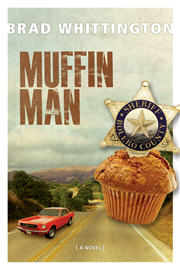
It's the moment all you Nookers have been waiting for: Muffin Man is now available on the Nook, in addition to Kindle and paperback.
John Lawson, sheriff of the quiet Hill Country town of Bolero, Texas, attempts to quell a feud between the local megachurch and a construction contractor, but it escalates from picketing to vandalism to arson.
The case is derailed by the unwelcome return of John's free-wheeling bipolar father, who arrives in the same red Mustang he drove away twenty-four years ago when he abandoned the family.
But ultimately it is the muffin that his overzealous deputy bags as evidence that threatens John's ordered life, possibly beyond repair.
Brad Whittington is not only back, he’s at his best. I haven’t been this excited about a new fictional detective since Martin Walker’s Bruno, Chief of Police. Have no doubt: Muffin Man delivers!
–J. Mark Bertrand, author of Back on Murder and Pattern of Wounds
Whittington has baked up a winner in Muffin Man. With dry wit, poignant humanity, and a setting as rich as Texas earth, Whittington proves his fl air for storytelling once again. A great book.After six years of silence, Whittington’s highly anticipated entrance into the general fiction market combines his considerable storytelling talents with influences as diverse as Richard Russo and Michael Connelly. Muffin Man strikes a balance between comedy and drama and takes the trademark Whittington elements of rich setting, engaging characters, and turn of phrase to a new depth.
–Tosca Lee, NY Times bestselling author of Demon: A Memoir, Havah: The Story of Eve, and The Books of Mortals series
August 2, 2012
They Eat Puppies, Don't They? **
 I went to see Buckley at a signing sponsored by the LBJ Library and the Texas Book Festival. He was clever and articulate, as always. Despite my recent change of heart regarding Buckley, I picked up a copy for signing to pass on to the one who turned me on to Buckley. But I read it first. ;-)
I went to see Buckley at a signing sponsored by the LBJ Library and the Texas Book Festival. He was clever and articulate, as always. Despite my recent change of heart regarding Buckley, I picked up a copy for signing to pass on to the one who turned me on to Buckley. But I read it first. ;-)It's classic Buckley, timely, funny, sarcastic, and superficial. It's the last one that has caused me to go off my feed when it comes to Buckley novels. If you haven't read any Buckley, you should definitely give him a shot. At least two or three.
July 26, 2012
The Sins of the Fathers ***
 In my not-so-humble but quite accurate opinion, if you have a chance to read through a Lawrence Block novel, do it.
In my not-so-humble but quite accurate opinion, if you have a chance to read through a Lawrence Block novel, do it.This is the first Matthew Scudder novel, written in 1976. It features a sparse, almost journalistic style with little inner monologue. All dialog and action. I liked the story, but found myself yearning for a little peek into Scudder's psyche.
Like A Confederacy of Dunces, this novel was written before political correctness took over and it's interesting to see the contrast with modern attitudes.
In addition to his novels, Block wrote books on the craft and a column in Writer's Digest for many years (which was picked up by James Scott Bell). He's over 70, but on the cutting edge of the ebook revolution. Gotta love that.
July 19, 2012
A Paramedic's Story: Life, Death, and Everything in Between **
 I picked this up when I first got the Kindle and dropped back to it when I was between books. It isn't a particularly well-written book and it is occasionally crude, but it has a lot of heart. Funny anecdotes and heart-breaking stories that span the career of a paramedic in Louisiana.
I picked this up when I first got the Kindle and dropped back to it when I was between books. It isn't a particularly well-written book and it is occasionally crude, but it has a lot of heart. Funny anecdotes and heart-breaking stories that span the career of a paramedic in Louisiana.It's a good book to dip into occasionally. I don't think I would have liked it as much if I went straight through it in a few sittings.
July 12, 2012
Nothing to Hide ****
 Third in the series after Back on Murder and Pattern of Wounds, Nothing to Hide stands out as Bertrand's best work, yet. Aging and beleaguered, Detective Roland March might actually be out on his ear this time.
Third in the series after Back on Murder and Pattern of Wounds, Nothing to Hide stands out as Bertrand's best work, yet. Aging and beleaguered, Detective Roland March might actually be out on his ear this time.An occasional bounce into March's 1986 career as an MP allows the reader to converge on the identities of two key players in the current story crime.
Reading the previous two reviews will quickly let you know that I consider Bertrand's Roland March series a must-read. I had only minor, insignificant quibbles with the first and no reservations about the second. I don't speak lightly when I say that if you like Connellys' Harry Bosch series, there's a very good chance you'll like Bertrand. I read a lot of whodunits and I can't think of another I would say that, with the possible exception of Riordan's Tres Navarre series.
Like Connelly, Bertrand holds nothing back. You can make no assumptions and no one is safe. You get the feeling he'll kill of March if it serves his purpose, or render him irrelevant. A writer like Bertrand can pick up with another protagonist and off we go again. Not that I'm suggesting I've had enough of March. Quite to the contrary.
I haven't asked Bertrand if he has any other March novels under contract because I'm afraid of hearing the wrong answer. But if there's any fairness in this world, and that's a highly dubious speculation, then we're in for many more years of Roland March goodness.
In the meantime, catch up. You don't want to be behind when the next one comes out.
July 5, 2012
The Last Four Things ***
 I discovered Hallinan on DorothyL.com, an email list for fans of detective fiction. This book is the first in the Simeon Grist series and a good start. It's a first-person novel and I like the voice of the protagonist, not quite hard boiled, but plenty tough while being somewhat cerebral. It's a good story with plenty of action and plenty of depth and I enjoyed the ride.
I discovered Hallinan on DorothyL.com, an email list for fans of detective fiction. This book is the first in the Simeon Grist series and a good start. It's a first-person novel and I like the voice of the protagonist, not quite hard boiled, but plenty tough while being somewhat cerebral. It's a good story with plenty of action and plenty of depth and I enjoyed the ride.Here are a few quotes I picked out:
His fingers groped toward each other and met again over his stomach like five overweith pairs of illicit lovers on safe ground at last.
They were obviously ready to protect that wet red carpet with their lives, if the need arose. The one on the right had the kind of face that suggested that he hoped the need would arise, and sooner rather than later: fat, downturned lips, a short thick pug nose, and two stupid little eyes lurking close together under a bony brow-ridge that I thought had been eliminated from the gene pool several million years ago. The other one just looked dumb.I have only one quibble, a topic I brought up in a previous review, the SNR (story-to-noise ratio). In several places the action comes to a stop for lengthy discussions of topics that are relevant to the mystery at hand but that do not support the forward momentum of the narrative, conversations between characters about religion or philosophy or other things. Hallinan is an excellent writer and put together a fine series opener, but in my not-so-humble-but-always-accurate opinion it would have been better served by whittling these tangents and streamlining the story.
That being said, it's still worth reading, and I'll be continuing in the series. Give it a shot.
July 3, 2012
Neil Gaiman on writing for money
I decided that I’d do my best in future not to write books just for the money. If you didn’t get the money, then you didn’t have anything. And if I did work I was proud of, and I didn’t get the money, at least I’d have the work. –Neil Gaiman
July 1, 2012
Living with Fred and Exploding Eggs
One of the best things about being published is hearing from readers. The reviews for Muffin Man are all entertaining to read, even the the two-star reviewer who claimed it wasn't as engaging as Russo's Pulitzer-prize-winning Empire Falls (in my dreams!) and who ended the review with:
I going out to eat a donut now. byeWhich I took indicate that the muffin may have had a greater impact on him/her than he/she thought.
And nothing tops the review from IZONPRIZE that opens with:
Brad Whittington had me dedicated to the final page, from Day 1 like a momma chimpanzee looking for fleas on her only child.But a recent email has the most unusual story associated with reading my books that I've received to date.
Here's an excerpt.
My eyesight is pretty bad, since I am now 86, so my daughter bought me a Kindle and I get to read anything that she has loaded in. I am REALLY enjoying the Fred stories.
I appreciate your rich vocabulary, which you use so extravagantly. I suspect a lot of folks don't know what treasures you draw from.
I was getting such a kick out of your story this afternoon that I forgot I had put five eggs on to boil, and didn't remember them till they started exploding. After the third shot-egg blast I got up and found egg parts all over the kitchen, and a horrible stink besides.
But -- so -- on with the book. Thanks so much for writing the way you do.If I wasn't already driven to write incessantly, emails like this one would do the trick.
Keep those cards and letters coming.
June 28, 2012
The Last King of Texas ****
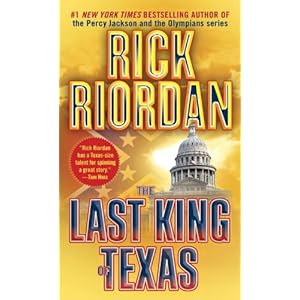 Although I think I've read everything Rick has written, to date I've only reviewed one other Tres Navarre novel, The Devil Went Down to Austin. Not for lack of love, but because when I was reading the other books, I wasn't writing reviews. I come back to The Last King of Texas pursuant to a character I'm developing for my next novel, a dealer in arcade and casino games for the greater southwest region. As it turns out, there's not a lot in common between my character, Buckworth, and Riordan's Del Brandon, carnival ride dealer down in San Antonio.
Although I think I've read everything Rick has written, to date I've only reviewed one other Tres Navarre novel, The Devil Went Down to Austin. Not for lack of love, but because when I was reading the other books, I wasn't writing reviews. I come back to The Last King of Texas pursuant to a character I'm developing for my next novel, a dealer in arcade and casino games for the greater southwest region. As it turns out, there's not a lot in common between my character, Buckworth, and Riordan's Del Brandon, carnival ride dealer down in San Antonio.But any minute reading a Tres Navarre novel is not wasted, regardless the motivation or outcome. This is actually the first Riordan novel I ever read, having discovered it while living in Honolulu. I mean, how can you pass up a novel with this title? I immediately went back and got the first two and moved on from there.
I've had the chance to meet Riordan on three or four occasions, the first being when I took a half-day workshop he taught on writing a mystery novel, just before the first Percy Jackson book came out. Extremely nice guy.
I dare anyone to read the first chapter of this book and set it down and walk away. I can't imagine the person who could do such a thing. Well, there's my son-in-law, but nobody else. I would give you some quotable lines, but there are dozens in every chapter, so I lost track.
Look, forget all that. Just go out and get the dang book and read it. Okay?
Oh, and Rick, I know you're busy writing best-seller YA novels left and right, but hire someone to be-Kindle your Tres Navarre backlist. Just do it.
June 21, 2012
Little Dorritt **
 Bless me father, for I've been reading Dickens. It's been three years since my last novel.
Bless me father, for I've been reading Dickens. It's been three years since my last novel.Giving Dickens two stars out of four feels like cussing in church, but after looking over the review I gave Our Mutual Friend in 2009, I should have had the guts to give it two stars, also. I don't know if my tastes have changed dramatically from twenty years ago when I gave Great Expectations and David Copperfield four star reviews, or if these two more-recently-read-but-lesser-celebrated novels are that dramatically different from those two classics.
I enjoyed the BBC production of Little Dorrit so much, especially Andy Serkis's portrayal of Rigaud, that I grabbed a (free and pitifully formatted) copy of it for my Kindle last year. Clocking in at 334,000 words, it was clear that Dickens was being paid by the word and after five or ten hours of slogging through it, I was feeling every bump in the road and I was barely a third of the way through.
The book is divided into two sections, Poverty and Riches. I took a several-month break between the two to get my strength back up to finish it.
That's not to say there is no brilliance in Little Dorrit. To the contrary, there is quite a bit of it, particularly the satire of the Circumlocution office. But like the modern US welfare system, of which Dickens would doubtlessly have been a supporter, the novel seemed to suffocate under its own weight.
For example, the character of Flora Finching was humorous due to her intense case of logorrhoea, but it was illustrated through passages of borderline-indecipherable monologue that went on for pages. After a while the amusement fades and you just have to start skimming.
Mea culpa, but there it is.
June 14, 2012
Spider Dance **
 In the final (as far as I know) novel of the series, Irene stays in New York on a mission to unearth the truth about her origins, particularly her mother.
In the final (as far as I know) novel of the series, Irene stays in New York on a mission to unearth the truth about her origins, particularly her mother.On the upside, we have the full cast of characters we have come to know and love (excepting Watson), historical and fictional, and a gruesome murder in the Vanderbilt mansion to solve.
On the downside (for my reading tastes), in Irene's search for her mother, we have a seriously degraded SNR, pages and pages of interviews with various characters about what they remember, copious pages of declamation on women's rights and gender roles and social mores. And interspersed with the story we have an alternate narrative of an unnamed "dangerous woman" four of five decades earlier.
The issue for me is that I'm reading this series solely because it's an extension of the Holmes canon and involves a clever interpretation of an interesting character from that canon. As such, I'm looking for a mystery story and these other things, however well written they may be, are of no interest to me. But that is a creative decision that right belongs to the author, as it should. It just means that I am not the target audience for the last few books in the series. But I wish Ms. Douglas great continued success with her books
June 7, 2012
Femme Fatale **
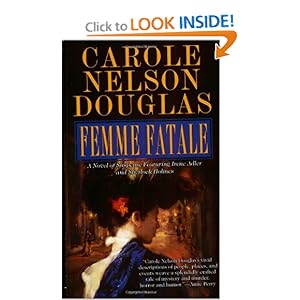 In the (to my knowledge) penultimate Irene Adler story, The Woman returns to her roots, America, drawn by a meddling Nellie Bly. People from her mostly forgotten childhood are dying by the cartloads and three people are on the case, working independently, Adler, Bly, and Holmes.
In the (to my knowledge) penultimate Irene Adler story, The Woman returns to her roots, America, drawn by a meddling Nellie Bly. People from her mostly forgotten childhood are dying by the cartloads and three people are on the case, working independently, Adler, Bly, and Holmes.I loved the first few Irene books, but the further I go into the series, the lower the SNR (story to noise ratio) drops. By noise I mean things that don't move the story forward, such as discourses on fashion or religion or gender roles or women's rights or pages of banter between characters or back story relating what happened in previous books.
You expect some of this in the way of establishing character or sense of place or other of the little things authors do to keep a novel from turning into a screenplay. And to be sure, there is a certain amount of personal taste involved in determining the proper SNR, but I have a fairly liberal meter, as anyone who has read my novels knows.
But when you go twenty or more pages in a detective novel without anything of significance happening, the SNR is dangerously low.
So I've taken to skimming, which is practically against my religion. This saddens me because of how much I wanted to like the whole series as much as I liked the first few books. Oh well.
May 31, 2012
Castle Rouge ***

There are many tense moments in this conclusion to the story begun in Chapel Noir. And although Nell remains a bit too discursive for my taste, she is finally beginning to develop beyond the priggish prude that inhabits the earlier books. And I still find myself skimming over long sections of backstory rehearsing things we already know or "sermons" on various topics, such as gender role expectations and such.
In addition to the existing historical characters that populate previous books and this one, we add a nascent Rasputin.
Here's a nice quote: Through the fog and smoke the streets shone like a black cat's well-licked coat.
May 24, 2012
Chapel Noir ***
 Chapel Noir is a departure from the pattern of the previous four. First, it's told from three different viewpoints. Second, it's a cliff-hanger, continued in Castle Rouge. Third, it's darker and more graphic, dealing as it does with Jack the Ripper.
Chapel Noir is a departure from the pattern of the previous four. First, it's told from three different viewpoints. Second, it's a cliff-hanger, continued in Castle Rouge. Third, it's darker and more graphic, dealing as it does with Jack the Ripper.It still has many of the elements that attracted me to the series:
- Extension to the Holmes canon.
- Stylistically consistent with the canon (excepting the some of the alternate viewpoint material).
- Cameo Holmes appearances, actually, fairly substantive appearances.
- Cameo appearances of historical characters (quite a few, and very cleverly done)
Her red hair was frizzled into a fright wig. Her decolletage overflowed a wasp-waisted bodice like two loaves of unbaked French bred. She had a sharp nose above a cheese-soft chin that faded into the high collar of fat cushioning her throat like a necklace of fleshy aspic. Her bead-bright eyes moved like roaches in the suet pudding of her face to study us.
May 17, 2012
Irene's Last Waltz ***

Douglas does a great job of weaving canonical story lines into a new story, and this one is no exception. There are a lot of things happening on a lot of levels with several nice appearances of a certain personage.
One of those plot lines involves Charles Frederick Worth, the legendary designer. As a result, I resorted to a bit of skimming over the copious descriptions of fashion. YMMV.
This book was reissued as Another Scandal in Bohemia in 2003.
May 10, 2012
Irene At Large ***
*** Irene At Large, Carole Nelson Douglas, 1992
 I like it when an extracononical story pulls in either contemporary references to historical figures or canonical characters.
I like it when an extracononical story pulls in either contemporary references to historical figures or canonical characters.
In this installment of the Irene Adler saga, Douglas pulls in a character from the Holmes story "The Case of the Empty House" in which Holmes thwarts his own assassination by the second most dangerousm man in England, Colonel Sebastian Moran. She does an excellent job of integrating the story line with what will happen five years later in the Doyle story, even explaining why Watson acts as if he's never heard of Moran later.
One thing I'm not as much a fan of is the descriptions of fashion and extended banter. I expect female readers may have a different opinion, which is good since the majority of readers are female, but I find myself skimming sections that don't deal with the plot.
This book was reissued as A Soul of Steel in 2006.
May 3, 2012
Good Morning, Irene ***
*** Good Morning Irene, Carole Nelson Douglas, 1990

Two years ago I read Good Night, Mr. Holmes. I said I couldn't wait to read some more, but I did. Wait, that is. And now I've read some more and I'm glad I did.
As in the previous book, there is a brush with Sherlock Holmes, but it's not the focus of the story. Rather, the mystery of tattooed corpses missing a finger lead the trio (Irene, Godfrey, and chronicler Nell) from Paris to Monaco. Entertaining reading for Holmes fans and others.
Here are a few quotes:
"The longer I spoke the more convinced I became that I was hanging a sheep for a lamb."I liked that one because of how she mangles the saying, "Might as well be hung for a sheep as for a lamb." into hanging the animals.
"I will say this: that while in the relationships between men and women there is much stuff of comedy and tragedy, there can be found in the marital bed an intimacy that mingles the best of the human and the divine."FYI, the book was reissued as The Adventuress in 2003.
April 26, 2012
Brain Rules ***
*** Brain Rules, John Medina, 2008
 Stumbled across this book somewhere and used it as my workout read. It definitely passed the Elliptical Test. The book is divided into 12 rules, such as:
Stumbled across this book somewhere and used it as my workout read. It definitely passed the Elliptical Test. The book is divided into 12 rules, such as:
- 1. Exercise boosts brain power. (How appropriate!)
- 4. We don't pay attention to boring things.
- 8. Stressed brains don't learn the same way.
The research is fascinating and the writing is engaging. And it has many applications. It will change the way I write.
One common bit of writing advice is to engage all the senses. Don't just describe how it looks, but also how it sounds or smells or feels. The research bears out this advice. Tests show that when you read a word involving smell, the same part of your brain activates as when you actually smell it. So by writing to all the senses, you stimulate more of the brain, which makes it a richer experience and therefore more memorable.
And that's just one cool idea I got from the book.
April 19, 2012
The Wednesday Wars ***
*** The Wednesday Wars, Gary D. Schmidt, 2009
 I'm not sure what got me to read this book. I've heard good things about it, but I'm not a regular reader of YA fiction. But somehow it ended up on my Kindle and I read it.
I'm not sure what got me to read this book. I've heard good things about it, but I'm not a regular reader of YA fiction. But somehow it ended up on my Kindle and I read it.
Excellent book for anyone, regardless of age. It's set roughly around the same time as Welcome to Fred. Here are a few quotes that stuck with me:
- I never thought being in seventh grade would mean so many death threats.
- It was what eighth graders whose career goal was the state penitentiary did.
April 12, 2012
The Non-Designers Design Book ****
**** The Non-Designers Design Book, Robin Williams, 2008
 I can't possibly say enough good things about this book. As a visual novice taking on the task of designing book interiors and marketing collateral for Wunderfool Press, this book rightly assumes I know nothing and goes from there.
I can't possibly say enough good things about this book. As a visual novice taking on the task of designing book interiors and marketing collateral for Wunderfool Press, this book rightly assumes I know nothing and goes from there.
If you're not sure whether it's worth picking up, go to the preview on Amazon and scroll down to page 12. If that doesn't sell you, then the book is not for you. Williams doesn't have that much to say about book design, neither covers nor interiors, but the principles she sets down are universal and the concepts are easily applied to any visual project that relies on type.
Here are a few of the basic rules of thumb Williams advocates:
- Don't be a wimp.
- Don't use 12-point type.
- Don't use Times, Arial, Helvetica, or Sands.
- Don't be a wimp.
I jest. But only a little. Each page of the book is a beautiful visual, and the content is simple and foundational. If you are a novice and have to do any layout at all, get this book!
April 5, 2012
A Geography of Time ***
*** A Geography of Time, Robert Levine, 1997
 This nifty little book has a wealth of insights into the pace and quality of life as it pertains to the time-related aspects of our worldview. It's filled with empirical research and personal anecdotes from the author. There are quite a few surprises and a section on suggestions of how to incorporate aspects of other cultures to create a more balanced approach to life when it comes to the use and misuse of time. It's worth a read.
This nifty little book has a wealth of insights into the pace and quality of life as it pertains to the time-related aspects of our worldview. It's filled with empirical research and personal anecdotes from the author. There are quite a few surprises and a section on suggestions of how to incorporate aspects of other cultures to create a more balanced approach to life when it comes to the use and misuse of time. It's worth a read.
March 29, 2012
Love Mercy ***
*** Love Mercy, Lisa Samson and Ty Samson, 2010
 You have to ration out the Lisa Samson books these days. I trickled this one out through 2011 and the begining of 2012, since it was the last one on my shelf unread.
You have to ration out the Lisa Samson books these days. I trickled this one out through 2011 and the begining of 2012, since it was the last one on my shelf unread.
The book is divided into parallel narratives (Lisa and her daughter, Ty) describing a trip to Swaziland, but we don't get to Africa until around page 90. The journey begins years before in the Samson family move from suburban Baltimore, MD to urban Lexington, KY, and the larger move, from an insulated, self-referential worldview to a global worldview.
It's an intense read, but worth it. My only complaint is that Ty's sections were difficult to read for an old fart like me, being a script-like font on a grey background. The low contrast and challenging font reduced readability considerably.
Check it out. Who knows when the next Samson novel will surface?
March 26, 2012
Tips for Writers #1
March 22, 2012
Bipolar Disorder Demystified ***
*** Bipolar Disorder Demystified, Lana R Castle, 2003
 In keeping with my streak of reading books by people with a middle initial of R, I grabbed this not-so-little volume as research for a character in my current work-in-progress, Muffin Man.
In keeping with my streak of reading books by people with a middle initial of R, I grabbed this not-so-little volume as research for a character in my current work-in-progress, Muffin Man.
I found the first half of the book to be helpful for my purpose, which was to get a better handle on how to write the character. The second half, which is devoted to getting treatment and maintaining a balanced life, was less relevant to my story, so I just skimmed through it.
I would expect that if you're dealing with this disorder, either for yourself or someone close to you, this book would be helpful. I haven't read any others, but I expect it is unique in its approach of combining researched clinical information with personal experience.
My one complaint is that it isn't available for Kindle. I'd much rather have a 426-page reference book on an ereader than in print. I urge the author (hi, Lana, howzit?) to pursue releasing this and her other books, especially the out-of-print style guide, as ebooks.
March 17, 2012
Excerpts from an interview
While cleaning the desk I discovered a copy of an interview from when Living with Fred was released. It was for a religious organization. I fear I failed to satisfy their requirements because I never saw it in print.
For your dining and dancing pleasure . . .
Q. How did you become interested in writing?
A. I was an early and voracious reader. I began writing seriously in 1981 when I got a computer. Since then, I’ve been unable to stop myself from writing. Perhaps I should change medication.
Q. What compelled you to write a book on this subject?
A. I couldn’t stop myself from doing it. Neither could anybody else.
Q. What is the main theme or point that you want readers to understand from reading your book?
A. The main thing I’d like readers to understand is that they will always have a great time when they pick up one of my books. If they don’t laugh out loud at least once, I’ll refund their money.
Q. Are there some specific lessons you hope readers will learn and apply to their lives after reading your book?
A. Never date a practical joker.
Q. How does the book intertwine with God’s call on your life and how you are currently serving Him?
A. I feel God has called me to stop being so annoying. When I’m writing, I’m not annoying anyone.
Q. Do you have a favorite Scripture verse? What is it and why is it important to you?
A. Please be quiet! That's the smartest thing you could do. -Job 13:5 NLT. Those who know me realize how important this verse is.
Q. Thank you for taking the time to answer a few of our questions. As we close, is there anything else you would like to add?
A. Never use pliers on brass.
March 15, 2012
An Unquiet Mind ***
*** An Unquiet Mind: A Memoir of Moods and Madness, Key Redfield Jamison, 1996
 A fellow author recommended this book to me for research into my bi-polar character in Muffin Man. Ten days later I had finished reading the book, and that included shipping time from Amazon. It was that fascinating.
A fellow author recommended this book to me for research into my bi-polar character in Muffin Man. Ten days later I had finished reading the book, and that included shipping time from Amazon. It was that fascinating.
As the subtitle states, this is a memoir. Jamison not only suffers from what she calls manic depressive illness, as opposed to bi-poloar disorder, but is a professof of Psychiatry at the John Hopkins School of Medicine. So she is both a patient and a doctor, an expert by virtue of both extensive study and personal experience.
This is not a clinical book about the disease, it's a book about one woman's experience with the disease, albeit a very educated woman. As such, it was an invaluable resource for me and of immeasurable help in tweaking my character.
As I set out to write the novel and it became apparent that a significant supporting character would be bi-polar, I wrote intuitively based on my past conversations and direct experience with Dangerous Dan, my first-hand source when it comes to such things. It occured to me in December that perhaps I should broaden my understanding of the disease beyond one set of (very amusing) anecdotal data points, and thus the reading.
There is much to commend this book. It's and entertaining, engaging, informative, and unexpectedly moving account. Check it out.
March 8, 2012
The Prohibition Hangover ***
*** The Prohibition Hangover: Alcohol in America from Demon Rum to Cult Cabernet, Garrett Peck, 2009
 I picked this book up after I released What Would Jesus Drink, hoping it would give me some insight into how we could go from a 1789 Baptist minister owning a distillery and possibly having a hand in inventing bourbon to the 2006 Southern Baptist Convention making a resolution that no one be allowed a position in the organization if they drink.
I picked this book up after I released What Would Jesus Drink, hoping it would give me some insight into how we could go from a 1789 Baptist minister owning a distillery and possibly having a hand in inventing bourbon to the 2006 Southern Baptist Convention making a resolution that no one be allowed a position in the organization if they drink.
As it turned out, the book was helpful in that it documents the rise and fall of the temperance movement that highjacked several Protestant denominations and turned them into anti-scriptural prohibitionists. It also discusses Prohibition and the years following. There's a lot of interesting information in this book.
There were a few parts I found less interesting, such as extended discussions of the business aspects of the wine, beer and liquor industries and markets, down to discussing specific companies for extended periods of time. There are several places where Peck apparently states some suppositions or conclusions of his own without qualifying them as such. Also, he makes space for the occasional fit of editorializing and moralizing, ending the book with some serious call-to-action language. I agree with many of his views, but I was looking more for historical and sociological information than opinions.
Still, a worthy read for those interested in the topic.
March 1, 2012
Diary of a Part-Time Monk ***
*** Diary of a Part-Time Monk, J. Wilson, 2011
 This fascinating book was written by the creator of Brewvana.net and early appreciator of the 1996 essay that eventually became What Would Jesus Drink? He even quotes it in the book.
This fascinating book was written by the creator of Brewvana.net and early appreciator of the 1996 essay that eventually became What Would Jesus Drink? He even quotes it in the book.
J. is a homebrewer living in Iowa. As the book indicates, he became fascinated with the tale of the monks of Neudeck ob der Au outside of Munich who are credited with developing the rich-and-malty doppelbock style of beer to nourish their bodies through lengthy Lenten fasts.Packed with carbohydrates, calories and vitamins, this unfiltered "liquid bread" is said to have sustained the monks from Ash Wednesday to Easter, and more than 300 years later, the monastic history and quality of this beer style is well-known throughout the world.
For the 2011 Lent season, J. did a 46-day beer-and-water fast to test the legend of doppelbock’s origins, church connections, and nutritional value, as well as his own will power, and blogged about it on Brewvana. And he did it while continuing to work his job at the newspaper.
The first part of the book describes the history of the beer, of fasting, and what led him to the project, which I found interesting. He also goes into the medical aspects of the fast in great detail, including all that could go wrong, healthwise, from living on beer and water alone for over six weeks, which I found less interesting.
But the meat of the book is the daily journal of his experiences during the 46 days, and this part is excellent. His little project attracted international media attention, including folks like CNN and Fox News. J. gets on his soapbox a few times, but mostly it's just a window into the home life of a regular guy with an odd mission.
You should check it out.
February 29, 2012
Muffin Man Cover
Thanks for all your input. Here's the final cover art for Muffin Man. Just a month away from release, peoples!

February 23, 2012
Drinking With Calvin and Luther!: A History of Alcohol in the Church ***
*** Drinking With Calvin and Luther!: A History of Alcohol in the Church, Jim West, 2003
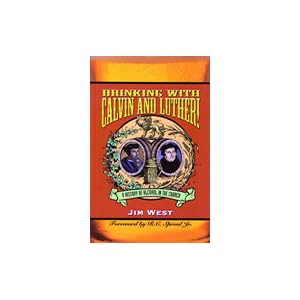 I've been looking for a credible history of the attitude of the church toward drinking and this is probably as close as it's going to get. It starts with the reformation, assuming that up till then the Catholics were in charge and obviously in favor of drinking. However, I read some quotes in other books dated from the 4th century which indicate that there were abstainers and prohibitionists from early on, so the dark ages are still in doubt.
I've been looking for a credible history of the attitude of the church toward drinking and this is probably as close as it's going to get. It starts with the reformation, assuming that up till then the Catholics were in charge and obviously in favor of drinking. However, I read some quotes in other books dated from the 4th century which indicate that there were abstainers and prohibitionists from early on, so the dark ages are still in doubt.
All that aside, it appears that Protestant denominations took a turn toward teetotalism in the mid 19th century. Before then things weren't quite so extreme. In fact, I learned that bourbon was invented by a Baptist preacher from Kentucky, Elijah Craig! (It's pretty good stuff, too.) Rev. Craig was in his thirties during the Revolutionary War. He was ordained a Baptist preacher in 1771 and in 1789 founded a distillery.
It's an interesting book, primarly devoted to stories of theologians beginning with Martin Luther. The section devoted to analysis of the verses makes some good points, but lack the obsessive deep-dive into the languages characterized by Patton's work.
My take: WWJD
February 20, 2012
Why I hire a graphic artist for my covers
Publishers send an ARC (advance reader copy) to reviewers and potential endorsers before the release of the book so the reviews and endorsements are ready for the release. The ARC is not the final novel. It's not copy edited and doesn't have the front and back matter or the final cover.
A few weeks ago I found two potential endorsers. They are great writers and voracious readers, so I figured on sending an ebook version. Nope, they're both old-school. Paper copies. I can appreciate that, but that means printing out copies and mailing them. I thought about doing them at home on the office printer. Then I thought about going to Kinkos to have them printed and spiral bound.
Then it hit me. I'm going to have to do the interior design anyway, why not use Createspace to make an ARC? They could read a real paperback. But that meant I needed a cover. Me, the writer, not the graphic designer.
I could have gone with the draft version of the cover I got from my graphic artist, but I wanted to make it very clear that this is an ARC, not a released novel, so I chose to design my own cover. As you can see, there's a good reason I don't do my own covers for the final product.

February 18, 2012
Muffin Man Cover Art Redux
One detail I should have covered and, and one that is very important in marketing books, is viewing the covers in the sizes they will appear on online sales channels. The art may look good on the book, but if it doesn't grab the shopper at pixel sizes 56 x 86, 85 x 115, and 190 x 260. The middle size is particularly important as it is displayed it the list of hits.
Does that change your vote?




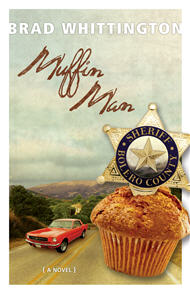
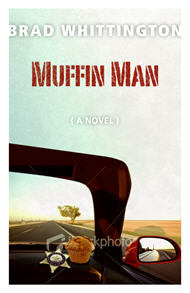
February 17, 2012
Muffin Man Cover Art
The lovely and talented Amanda Cobb is creating the cover art for Muffin Man. By looking at these two preliminary designs, you can see why I chose her for this project. Drop a line in the comments to tell me which one you like best, A (top) or B (bottom). However, I must warn you that The Woman has the final word.
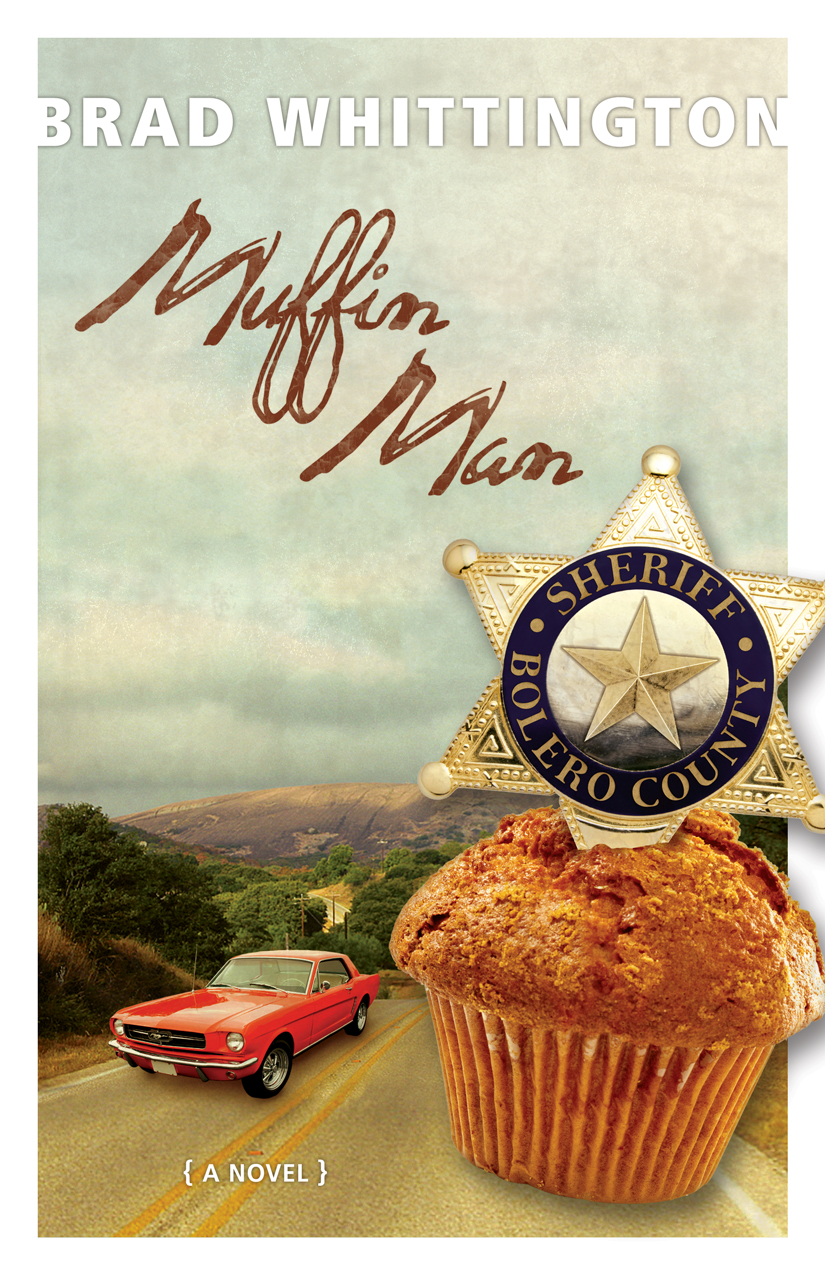
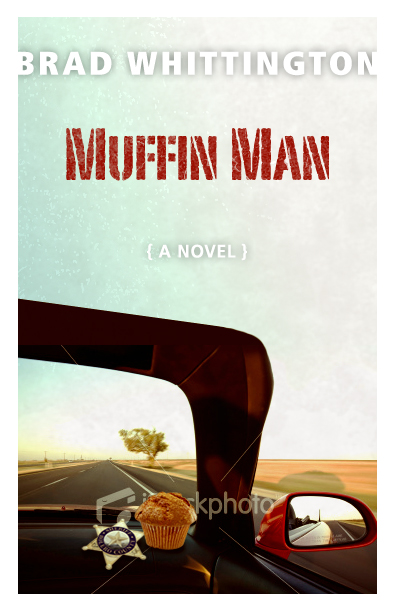
February 16, 2012
Cracking the Wine Case: Unlocking Ancient Secrets in the Christian and Drinking Controversy *
* Cracking the Wine Case: Unlocking Ancient Secrets in the Christian and Drinking Controversy, Scott E. Smith, 2010
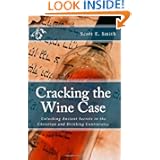
The thing that disturbs me about this book is that it purports to be an unbiased examination of the scriptures to find what the Bible says. But every chapter starts with a quote about the evils of alcohol and it takes over 100 pages before it gets to actually examining the scriptures. The first seven chapters stack the deck before we get there.
- Introduction: Stories about how alcohol abuse destroyed the family of a childhood friend and how God saved him from alcohol through a childhood experience.
- Chapter 1: Story about a drunk driver who killed someone. Story about arguing his case in a Bible study that met in a bar. Long section addressed to those with alcohol addiction.
- Chapter 2: Story about how Martin Luther was right about a lot of things but dead wrong about drinking.
- Chapter 3: Compares drinking to porn, snake venom. Quotes from AA that the only safe way to drink is to not drink at all. Negative, medical facts. Analyzing motives of those who drink. Admonitions that God can set you free from a distorted lifestyle of drinking.
- Chapter 4: Calls preachers who advocate drinking "wolves in the pulpit."
- Chapter 5: Compares drinking to premarital sex, LSD, meth, cocaine. If you love God, you will do want he wants, which is to not drink.
- Chapter 6: Different words for wine in the bible.
- Chapter 7: History of fermintation techniques.
All of this before we actually examine what the Bible says in Chapter 8. By now he's lost credibility with me because of this whole sandbagging technique. As far as looking at the verses, it's nothing I haven't already read in the other books, although once again there are discrepencies with how other abstainers interpret things.
For example, some say Paul told Timothy to take wine to kill the bacteria. Others say there is no evidence for this and people who say that are distorting the scriptures, that it is well known that wine is not good for for your stomach, and obviously in this case oinos meant grape juice.
If there were any doubt about this being a dispassionate study, chapter titles such as "Jesus the Miraculous Bartender" (referring to the miracle at the wedding at Cana) remove any doubt. This chapter is also a good example of the creative explanations that these guys seem compelled to come up with.
This book treats all drinkers as if they are alcoholics and in some places outright says that anyone who takes one drink will eventually become an addict and have his life destroyed. This is clearly not true and compromises the credibility of his other statements. To be fair, Smith's viewpoint might be colored by the fact that he has a prison misistry to addicts whose lives have been destroyed by alcohol. But not everybody who drinks wine ends up a drunk. That's just a fact and this book does a disservice by claiming otherwise.
My take: WWJD
February 13, 2012
The Bottoms ***
*** The Bottoms, Joe R Lansdale, 2001
 This one won the Edgar award for Lansdale. The usual disclaimer applies, not as much as a Hap and Leonard book, but more than A Fine Dark Line. The story of a serial killer in 1934 East Texas back before the term was invented, told through the eyes of a pre-teen son of the constable.
This one won the Edgar award for Lansdale. The usual disclaimer applies, not as much as a Hap and Leonard book, but more than A Fine Dark Line. The story of a serial killer in 1934 East Texas back before the term was invented, told through the eyes of a pre-teen son of the constable.
The voice is perfect and the writing and characters are prime Lansdale material.
I felt it moved a bit slow for a thriller, with the investigation moving in fits and starts as circumstance advanced it. It came to a complete stop when Grandma showed up, and again when the father escaped in a bottle.
Normally, the hero would advance the plot, but the protagnist is a pre-teen kid who can't really advance the plot of a multiple murder investigation and the investigator is a backwoods constable with know training, experience or knowledge in how to investigate. Consequently, happenstance is the main engine to move things forward, which is not as satisfying as a pro-active protagonist.
I guessed the killer early on, but the writing was strong enough to carry the story even so.
Interesting that the book won the Edgar, as I wouldn't have thought of it as a potential winner. Maybe I should consider submitting Muffin Man.
February 9, 2012
Bible Wines or the Laws of Fermentation and Wines of the Ancients ***
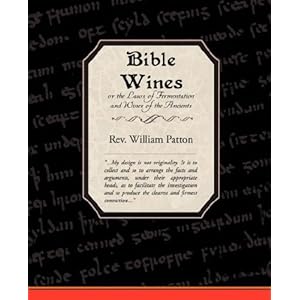
It was clear from the title page, which indicated this book was published by the National Temperance Society, what I would find inside. However, despite the fact that it was written 140 years ago, I found it refreshing in many respects, particularly this sentiment from the introduction from which other writers in this review should have taken a cue from (emphasis mine):
"My reasonings are conducted in candor, and with due respect to those from whom I am constrained to differ. Their views are carefully stated in their own chosen language, and their quoted authorities are fairly given. When their relevancy is questioned or their inferences shown to be illogical, no suspicion of motives has been allowed. Truth gains nothing by asperities."Despite the fact that this book is older than all the others I read by over 100 years, it was the most compelling for the case of abstinence. It's not easy to read, but I recommend for anyone who wants to dig deep in this subject. I'm not completely convinced, but this honest and respectful approach is far, far better than the snarky arguments of 21st century writers.
My take: WWJD
February 6, 2012
Hunger Games ****
**** Hunger Games, Suzanne Collins, 2008
 I've seen all the hype about Hunger Games for the past few years, but I tend to discount hype and I had plenty of things I needed to read, so I didn't bother to check it out. But I saw the trailer for the movie and thought perhaps I should check it out before the movie came out. I saw it was under $6 on the Kindle, so I grabbed it and read it in a weak moment.
I've seen all the hype about Hunger Games for the past few years, but I tend to discount hype and I had plenty of things I needed to read, so I didn't bother to check it out. But I saw the trailer for the movie and thought perhaps I should check it out before the movie came out. I saw it was under $6 on the Kindle, so I grabbed it and read it in a weak moment.
Wow. That's all I can say. Wow. This is a rare case of the hype being justified.
I guess I can say a little more, but Wow. The writing is good from the start, but when the games begin it becomes almost impossible to put this thing down. And the final battle in the games, holy freaking cow! I understand this to be a YA book, but man is it gnarly. I'm not a fan of movie violence, so who knows if I'll do the movie or not. Probably. We shall see.
Bottom line: Worth the read.
***Spoiler alert***: There was one thing that bothered me about this book: How the protagonist doesn't snap to the fact that the romantic interest from the other tribute is sincere. It took her way to long to realize he was legit.
EBOOK FORMATTING ****
The ebook version was flawless. Didn't see a single typo, formatting issue or navigation problem. I can't rate the next/last chapter navigation from the 5-way navigation pad because I upgraded to the Kindle Touch, which doesn't have any buttons. I kind of miss being able to skip forward or backward a chapter, and I miss being able to change the orientation to landscape, but other than that, love the Touch.
February 2, 2012
The Biblical Approach to Alcohol *
* The Biblical Approach to Alcohol, Stephen M. Reynolds and Calel Butler, 2003
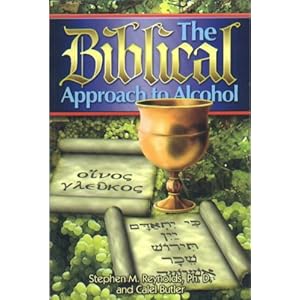 These books are starting to wear on me. That's the danger of reading books by preachers. They have no interest or experience in expressing an idea with an economy of words. In addition, this book needs a good going over for organization. It seemed to be a list of vignettes thrown down as Reynolds thought of them in random order, which made it more difficult to build a solid understanding of the larger picture.
These books are starting to wear on me. That's the danger of reading books by preachers. They have no interest or experience in expressing an idea with an economy of words. In addition, this book needs a good going over for organization. It seemed to be a list of vignettes thrown down as Reynolds thought of them in random order, which made it more difficult to build a solid understanding of the larger picture.
But there were several things that stood out for me and made me think, "You're serious about this? Really?" How about this quote:
"God left a number of things somewhat difficult to perceive as a test of spiritual perception of Bible readers. [Section about Jesus being the Messiah.] In the same way God may have left His true teaching concerning alcoholic beverages with what the undiscerning find to be ambiguities. This may have been with the view of separating the spritually perceptive (those whose ears are attuned to the true testimony of the Holy Spirit) from those whose perceptions are made dull by some sin which they cherish. Such a separation of those who take advantage of paradoxes in order to indulge their fleshly appetites may be used by God in judging man."
Really? You're saying God intentionally inspired an ambiguous message on alcohol so he could jerk believers around as a test to see who is really serious? Here's another passage 80 pages later:
"He may have left the teaching concerning the command to total abstinence somewhat obscure as a test to determine who among those who profess to believe in Him would discern His true meaning. Some, understanding that alcoholic beverages are a Christian liberty, overindulge themselves to the point of total ruin; others become soft and flabby in their Christian warfare; others who are teachers of religion mar their record by giving the people who follow them bad instruction. In the end God accomplishes His purpose of sorting wheat from chaff, and in grading how much each servant made from his talent, or talents."
God uses intentional ambiguity on the subject of alcohol to separate the wheat (saints) from the chaff (damned)? This gets even more absurd when, as we see later, that even people who agree on total abstinence disagree on the meaning of specific uses of the original language. And notice the repeated use of "may" in both passages, which leads me to the next complaint.
While these books frequently make good points, many of them don't seem content to leave it at that, but seem compelled to descend into speculation to drive the point home.
For example, regarding the miracle at Cana, Reynolds speculates that Jesus and Mary arrived late, and that unlike Mary, Jesus perceived that the crowd was drunk. He says this explains why Jesus reacted with outrage when Mary suggested he help out the steward with his wine problem. He also speculates that Jesus left quickly after creating 180 gallons of grape juice because he wouldn't hang out around drunk people.
Honestly, how can you take a book seriously when the author just makes up crap out of whole cloth and presents it straight-faced alongside serious research into the original languages? It destroys any credibility that might be left after the "God is jerking you around" statement.
I readily admit in WWJD that I'm no Biblical scholar and can't research back to the original languages. However, Bacchiocchi and Reynolds are Biblical scholars, so I paid attention to their exposition on the original words. I learned that there are two Hebrew words translated to wine in the OT, tirosh and yayin and one word in the NT, oinos. There one word translated to strong drink, shekar.
From Bacchiocchi I learned that tirosh always means grape juice. This was foundational to his position. On the other hand yayin and oinos sometimes mean grape juice and sometimes wine, depending on the context. And shakar always means fermented drink, except in one passage where it would be inconvenient if that were the case, so in that passage it means grape juice. He goes to great lengths and many pages to talk his way around this one exception, even though it seemed to me, the complete doofus in Hebrew I admit, that it was more handwaving than substance.
On the other hand, from Reynolds I learned that all of the words, tirosh included, can mean either wine or grape juice. The fact that tirosh could swing either way was very important to his point. So I'm left thinking, if these two scholars can't figure it out, what hope do I have of coming to a solid conclusion based on the original languages? Is God really going to judge whether I'm wheat or chaff based on whether I figure out what these two scholars can't agree on?
These two also seem to enjoy engaging in circular reasoning, which occurred repeatedly in both books. One example goes like this:
- We will search the original language to see what is the attitude of the Bible toward drinking fermented (alcoholic) drinks.
- In the original language, tirosh always means grape juice (or doesn't necessarily, if you're Reynolds) and always is used in positive references.
- In the original language, yayin sometimes means wine and sometimes grape juice. You can tell which by the context. If it's a negative reference, yayin means wine. If it's a positive reference, yayin means grape juice.
You see the problem here? In step three we have the problem of deciding which references mean wine. We solve that problem by assuming that if the reference is negative, it means wine. But that is begging the question, assuming the thing we're trying discover, which is what is the attitude of the Bible toward wine. So the exercise is completely useless.
Overall, there were some diverting sections, but much of the book was less than helpful. And, like Bacchiocchi, Reynolds takes a lot of space to talk about medical implications and social issues and several other things that have nothing to do with the scriptural position.